Three Ironmen of Bangladesh take assured strides
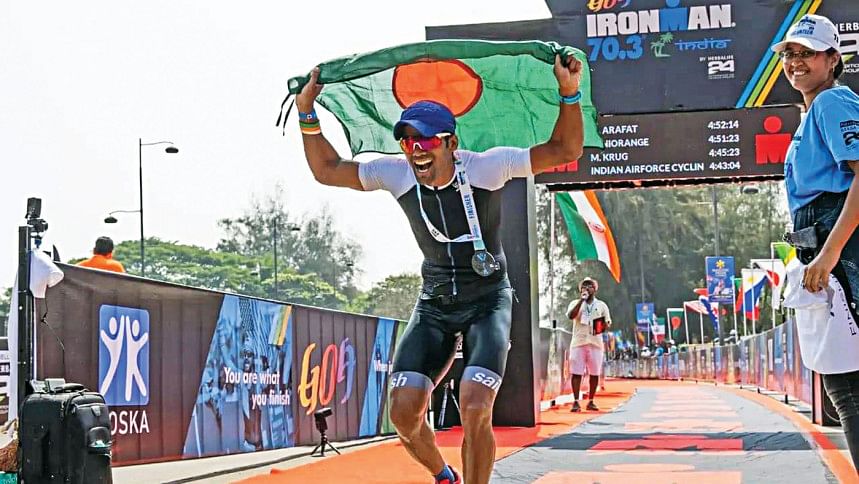
In a nation that lives and breathes cricket, it is ever so difficult for other sports to stand out and make its own position in the country's sporting culture. Another factor is the mindset of the sports industry as the focus given to the non-cricket genres of sports and its athletes is predominantly dependent on success. Such a genre is the Ironman competition -- series of long-distance triathlon races organised by the World Triathlon Corporation (WTC), consisting of a 3.86 km swim, a 180.25 km bicycle ride and a marathon 42.20 km run, completed in that order. However, with the achievements of Mohammad Shamsuzzaman Arafat, Mishu Biswas, and Abdullah Al Imran at the Ironman Championships, the endurance sports sector is making small yet assured strides in Bangladesh's sporting landscape.
In the Ironman Malaysia in November 2021, Arafat, who works at the Bangladesh Bank, exceeded expectations by leaps and bounds as he finished second in his age-group and 11th overall, while policeman Mishu was placed 11th in his age-group and 151st overall. And Imran, who completed two Ironman races in 2018 and 2019, opted to test his passion for swimming in the Oceanman Asian Championships in Thailand last year. There, contestants had to swim 10 kilometres in open water. In his age-group, Imran stood 13th with an overall rank of 34th, a performance that saw him qualify for the 2024 Oceanman World Championships in Thailand. For many in Bangladesh, the triathlon is a memory of a multi-faceted sport broadcasted on an American TV channel, but these three individuals are putting Bangladesh on the map with promising results. Moreover, they are inspiring the next generation to take up the global sport.
The Daily Star's Shabab Chowdhury caught up with all three to know how they pursue the challenges of competing in global sporting events while having a regular job.
Mohammad Shamsuzzaman Arafat
The Daily Star (DS): You have produced the most promising results by any Bangladeshi in Ironman competitions so far and you have been doing this for years now. What's next?
Mohammad Shamsuzzaman Arafat (MSA): I have gained a lot of self-belief after coming second in my age group, and 11th overall, in Ironman Malaysia. That result was even beyond my expectation. It gave me confidence and helped me believe more in my abilities. I want to build a sporting habit and a sporting culture in Bangladesh. We don't have any achievements in the Olympics and that bothers me. I trained with an American team a few days back where there were a few Olympians. There were children between the ages of 10-12 as well and the surprising thing was that they were there willingly, not because they had any sort of obligation to their parents or schools.
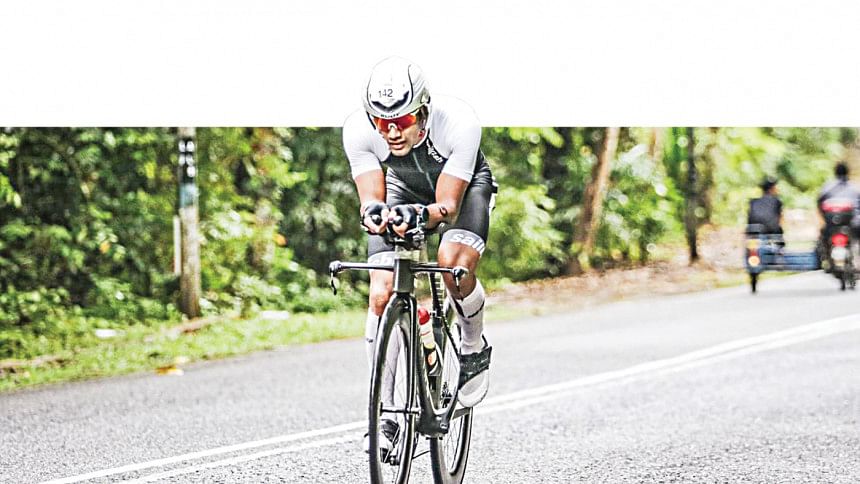
DS: How can competitions like Ironman Championships get the spotlight in a sporting culture dominated by mainstream sports like cricket and football?
MSA: It [Ironaman competitions] is still a long way from being a mainstream sport in our country, but we are trying. We see a lot of enthusiasts reach us on social media platforms. They seek advice and guidance and I try as much as possible with my limited resources to help them but I can only do so much as I am a government employee. Hence, it is not possible for me alone to build an institution and give structure to this particular discipline in Bangladesh but I have those aspirations.
About a month ago, I had discussions with the Ministry of Youth and Sports regarding the matter. I submitted an application to the National Sports Council stating the need for a federation to aid us with training facilities that can help us prepare and participate in global events, primarily the Olympics. I am still waiting for their reply.
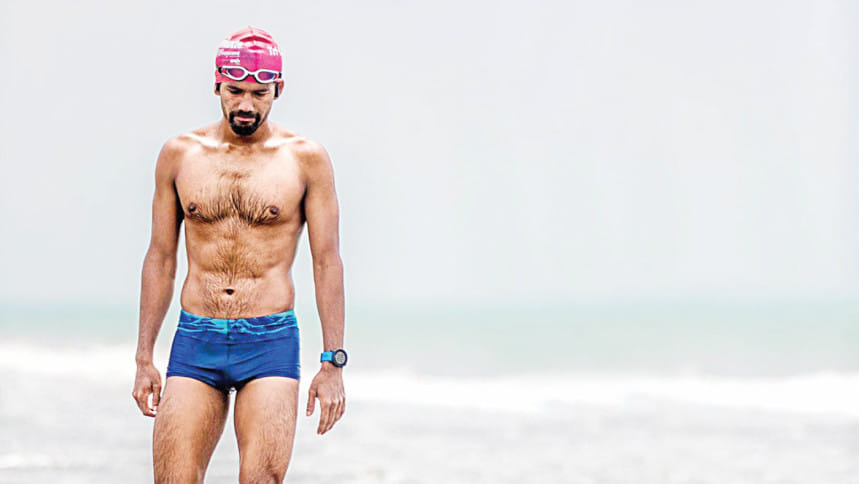
DS: How much has the sport been picked up by up-and-coming athletes?
MSA: The next generation will get more into it, surely. It is an expensive sport which is why you may see that most of the participants are full-time job-holders who almost entirely have to fund this journey by themselves. The bright side is that gradually we are seeing an increase in participation as more people are starting to know about Ironman competitions or just the running, swimming, and cycling community in general. Just, for example, we had only eight swimmers when we crossed the Bangla Channel in 2015 while we had 80 participants last year.
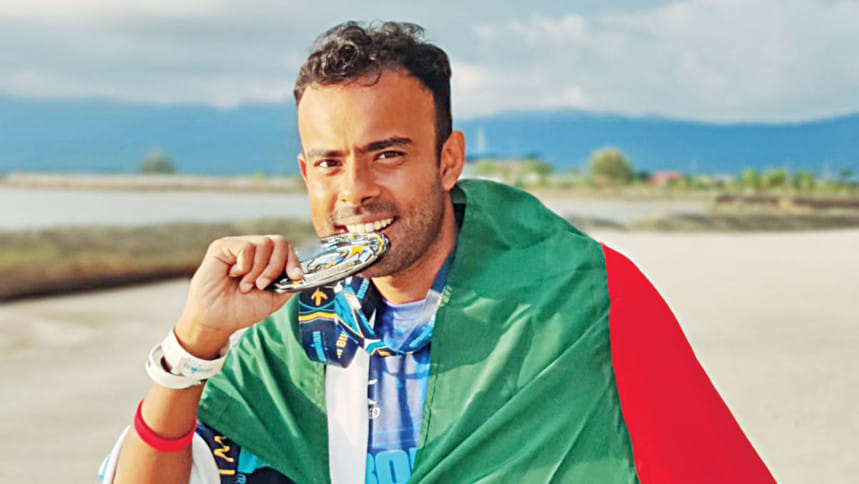
MISHU BISWAS
DS: How did a policeman get into the journey of being an Ironman?
Mishu Biswas (MB): As you know, in my line of work, I have to deal with a lot of stress. The stress of my job wore me down mentally and started to take a toll on my health. So, to break free from that pressure, I started running. I got in touch with the running community and ran in several marathons. From that, I moved on to swimming which is something that I had to learn late. I crossed the Bangla Channel and then decided to hone my cycling skills before I was confident that I could compete in the Ironman Championship.
DS: How did you find the time to train for competitions?
MB: It is difficult. Most of the time, I have to train alone because of my work schedule. I run at Ramna Park at 11pm and when it comes to swimming, it's difficult to find pools that are designed to train for competitions. Cycling brings its own set of challenges as we don't really have cycling lanes here. We have to train at Hatirjheel at night which is risky. There have been many accidents and I myself have been in at least two. You see, we do this out of enormous self-motivation and enthusiasm. Most of my training regimes and techniques are off the internet and from talking with foreign athletes.
DS: How can we make Ironman Competitions more mainstream in Bangladesh?
MB: It will take a lot of planning but at the very basic, I'd say that we would have to arrange events. The more events we arrange, the greater the participation will be and more athletes will come through. We can, at the local level, organise year-round triathlon events which will not only help us stay in practice throughout the year but will also ensure the growth of the sport.
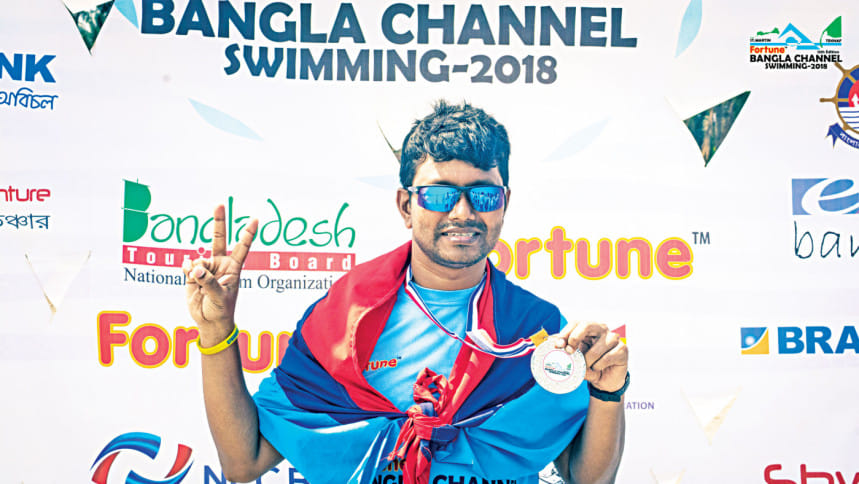
ABDULLAH AL IMRAN
DS: How did your journey to Ironman start?
AAI: I'm a graduate of Faujdarhat Cadet College and there we had a motto which was to become all-rounders in life. In my time there, naturally we had running, swimming and other activities. I had a passion for swimming and got good at it. You could say that the cadet in me made me get better at running and cycling.
I got to know about Ironman in 2015 through Facebook and saw even 50-year-olds competing the gruelling courses which inspired me to take the challenge. Since then, I started to prepare myself mentally for the Ironman challenge. I ran marathons, crossed the Bangla Channel and then finally participated in my first race which was the Ironman Malaysia in November 2018.
DS: For someone with an IT job since 2006, how did you manage training time for such a competitive sport?
AAI: It is difficult to manage time, to be honest. I wake up around 5:30 in the morning and then train till 8 am before being at the office by 10. During my preparations for a competition, I had to train in the afternoon as well.
DS: Your focus is naturally on the Oceanman World Championships but are you thinking about participating in another Ironman?
AAI: At this moment, I am preparing mentally for the Oceanman World Championships next year. I'm swimming regularly and yes, running and cycling have been side-lined for now. But I have to keep in mind about that as well because I want to compete in future Ironman events too.

 For all latest news, follow The Daily Star's Google News channel.
For all latest news, follow The Daily Star's Google News channel. 



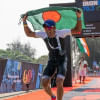
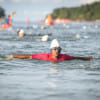
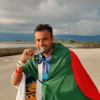

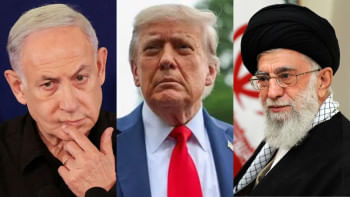
Comments